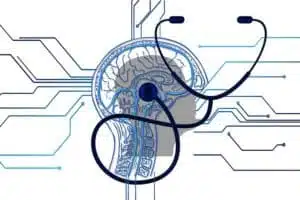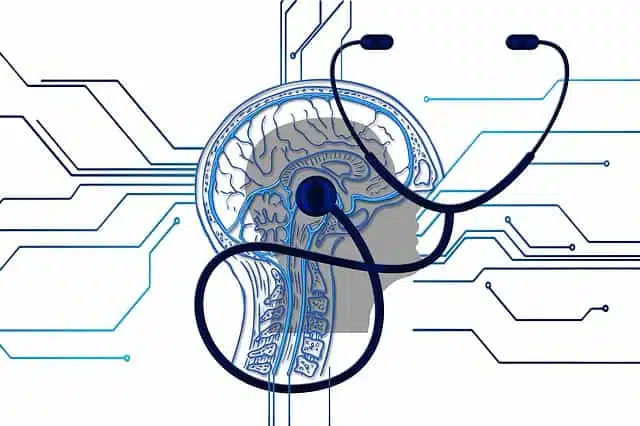Mental health first aid: why your business needs you to have it covered
 Rob*, the owner and director of a facilities management business, was conducting what he thought was a run of the mill performance discussion when he discovered that there was something bigger going on behind team member, Tim’s* recent drop in performance.
Rob*, the owner and director of a facilities management business, was conducting what he thought was a run of the mill performance discussion when he discovered that there was something bigger going on behind team member, Tim’s* recent drop in performance.
“I just didn’t see it coming. I didn’t know what to say when he told me he was struggling with depression that made it hard to get out of bed in the morning. He’d been trying to put a brave face on it all, but it was starting to get the better of him. I felt pretty helpless and useless to be honest. I’m meant to be the leader in my business… and I really do care for my team. I felt like I should have been able to do more to help”.
As a business coach I hear stories like this more regularly than most people may realise. Mental illness affects 1 in 5 Australians, so as a business owner your chances of either suffering from mental health problems yourself, or discovering that someone in your team or wider business network needs support in this area are pretty high.
Since last Thursday, October 10th 2019, marked World Mental Health Day, I’d like to explore how business owners, like Rob, can better prepare themselves for their role as a frontline support for team members who are facing mental health problems or experiencing a personal crisis situation.
On a human-to-human level, mental health first aid training could make a huge difference to potential outcomes for a staff member’s ill mental health. It also gives business owners the confidence that they know exactly what to do when a team member opens up to them about their personal struggles.
From a business perspective, with ill mental health costing Australian workplaces $4.7 billion in absenteeism, $1.6 billion in presenteeism and $146 million in compensation claims per year, it makes sense to take positive action in the form of early intervention.
What is mental health first aid?
Mental Health First Aid (MHFA) is much like physical first aid. You learn how to identify and understand the signs of a developing mental health problem or crisis and are given a plan for how to respond and assist until professional help is sought or the crisis resolves.
It covers several key areas of mental health problems, including:
- Depression
- Anxiety
- Psychosis
- Substance use problems
Poor mental health can present serious business risks
In my time as a business coach, I’ve seen cases where the risks of not addressing workplace mental health issues could well have been catastrophic. Poor mental health may affect:
- The safety and wellbeing of the person directly affected – left untreated, poor mental health can lead to self-harming behaviours or suicidal thoughts.
- The safety and wellbeing of others in your business (and even the wider community) –those who work in physically demanding roles, use power tools, drive a vehicle or operate heavy machinery may put themselves and others at risk. Since poor mental health can lead to a lack of sleep and affect a person’s ability to concentrate, the chances of injury or accident are greatly increased.
The benefits of MHFA for your business
As a business mentor, I see some major benefits that this kind of training offers a business:
- Reduce the risks that poor mental health presents to the affected staff member and others within your business
- Protect productivity – early intervention could mean that your team member is able to remain in their role while they seek professional help, more quickly resolve a crisis that is affecting their performance, or get back to work sooner after taking some time to regroup
- Protect your culture – reducing the stigma around mental health increases trust and builds a more positive and resilient team culture
- Protect your reputation – errors of judgement or lack of engagement may lead to poor customer experiences. These can really affect the way customers see your business and they may be moved to take their concerns public and leave a bad review
MHFA training could help you meet your workplace obligations
My business advice is always to reduce risk by staying up to date on your legal obligations. There are two sections of the Victorian Occupational Health and Safety Act 2004 where mental health first aid training may help you comply:
- Section 21 – An employer must, so far as is reasonably practicable, provide and maintain for employees of the employer a working environment that is safe and without risks to health.
- Section 22 – An employer must, so far as is reasonably practicable monitor the health of employees
Most of the clients I work with as a business coach are acutely aware of their obligation to provide a physically safe workplace. However, many are less familiar with the idea that the Act includes mental health-related safety as part of these workplace obligations. By taking part in MHFA training, you will become more aware of your specific obligations and how you can mitigate the risks by creating a workplace that supports both physical and mental health.
How to spot the signs of a developing mental health problem or crisis
Mental health first aid training will help you spot the early signs of an employee in crisis or experiencing a developing mental health problem. These may include:
- Sudden changes in mood – eg angry or aggressive outbursts or displaying a lack of motivation
- Changes in routine – eg not participating in normally enjoyed sport or social activities
- Drop in work performance – eg missing deadlines or poor attendance
- Trouble focusing – eg asking repetitive questions or working at a slower pace than normal
- Anxious behaviours – eg fidgeting, seeking extra reassurance, avoidance or irritability
- Decreased personal care – eg not washing or dressing to the usual standard
NB: note that this list is a high-level look at signs and symptoms of mental health or crisis behaviours. It does not replace the much more detailed information included as part of formal training.
It’s important to note that while these behaviours are common signs of a mental health issue, there may be some other explanation. As a business coach, I mentor clients to view these indicators as a signal that they should check-in with their team member and open up a conversation about what is going on for them either at work or at home.
ALGEE: the mental health first aid process
Mental Health First Aid™ Australia is a national non-profit health promotion charity focused on training and research. They have developed a framework for delivering mental health first aid, summed up with the acronym ALGEE:
A – approach, assess and assist
L – Listen without judgement
G – give support and information
E – encourage appropriate professional help
E – encourage other support (eg friends, family and other social networks)
The above five-step action plan learnt during MHFA training means will give you the specific actions to take and the right resources to point employees towards when you find yourself needing to offer mental health support.
Where to access mental health first aid training
I coach business owners to view first aid training, whether for physical or mental health, as an essential business investment. If you’d like to access MHFA training, then we can recommend our friends at Strawberry Seed HR Consulting. They offer Mental Health First Aid training and they specialise in trades businesses so they know their stuff. Check out their training here: https://strawberryseed.com.au/mental-health-first-aid-training/
Other resources for workplace mental health
The following organisations offer information and guidance about fostering mental health in the workplace:
Would you know how to help?
If you aren’t confident that you have the skills to support someone in your workplace who is struggling with these issues, then mental health first aid training may be the way to go. Yes, it makes good business sense, but on a more personal level, you may just start a conversation that makes all a real and positive difference to your team member’s recovery. You may even save a life.
(*names have been changed to protect the privacy of those involved).
—
Table of Contents
- What is mental health first aid?
- Poor mental health can present serious business risks
- The benefits of MHFA for your business
- MHFA training could help you meet your workplace obligations
How to spot the signs of a developing mental health problem or crisis- ALGEE: the mental health first aid process
- Where to access mental health first aid training
- Other resources for workplace mental health
- Would you know how to help?





